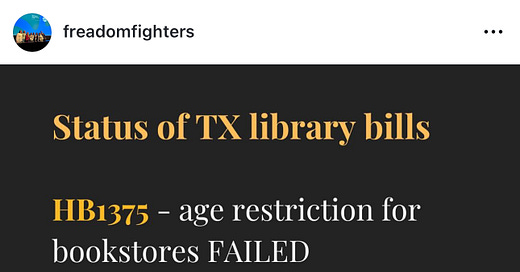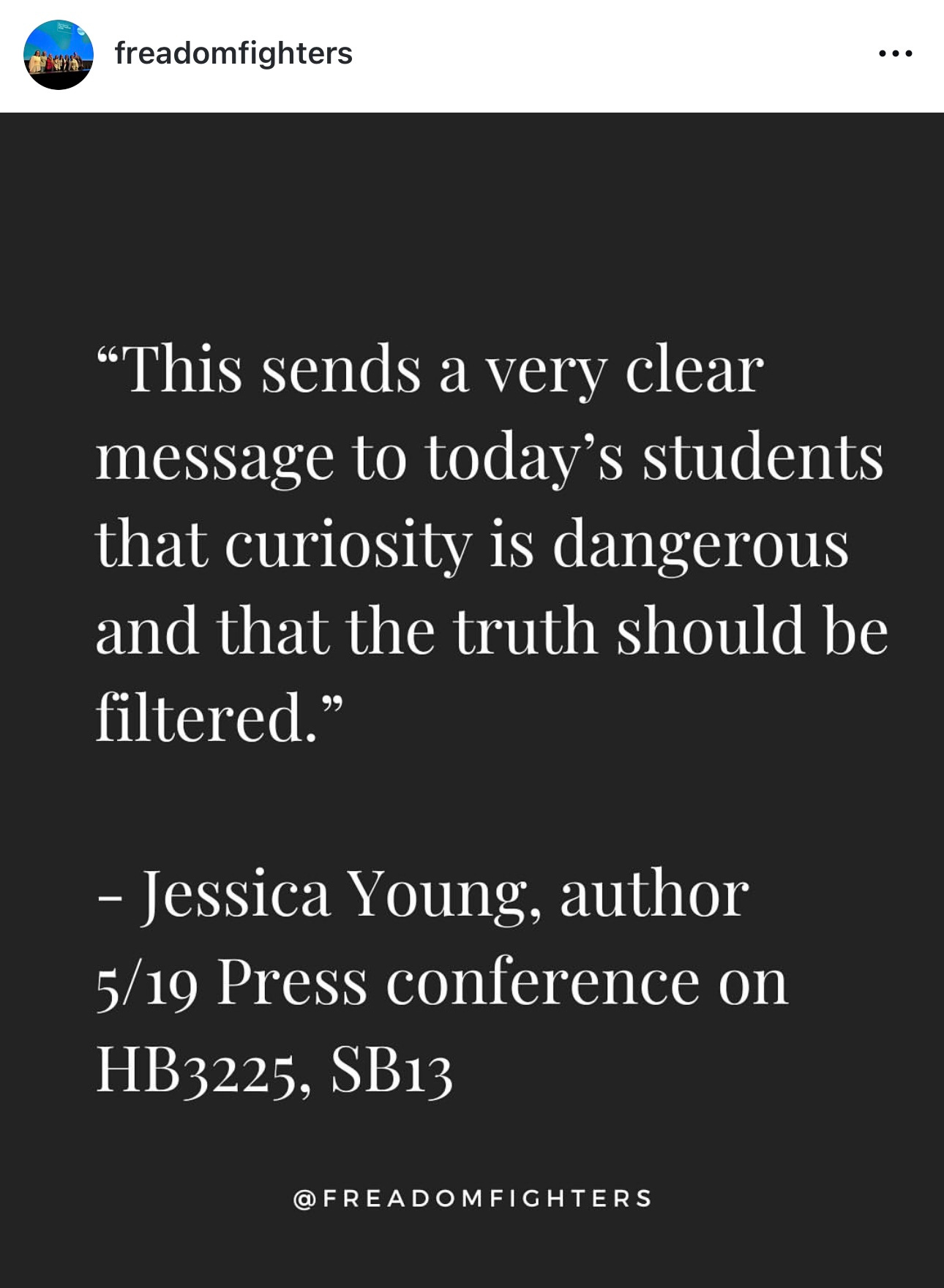As Texas goes, so goes the nation.
It’s a phrase I use quite a bit in my recent book, We Were Illegal, about my own family’s migration to Texas. It means that strategies and political playbooks get worked out in Texas, and then often roll out across the country.
One example of many from the 19th Century: Texian leaders used secessionist strategies during the Texas Revolution to successfully secede from Mexico because the Mexican government was going to abolish slavery. Texians (the word for Texas Anglos at the time) fought fiercely, withdrew their country, and formed the Texas Republic—to this day, the only nation in the history of the world to guarantee the right to own slaves in its constitution. (We did not learn this fact when we went to Six Flags of Texas, the theme park celebrating Texas’s unique history, growing up.) After nine years as a nation, Texas joined the US as the 28th state, tipping the delicate balance of enslaving states in the South and non-enslaving states in the North.
And then, less than twenty years later, the Texian playbook of secede, fight, form a new enslaving country became the Confederacy playbook. They used the lessons from the Texas Revolution to try to form another country in the South.
As Texas went, so went the nation.
This is true for so many other examples, it’s impossible for me to type them all up. Which is why what just happened in the Texas legislative session matters so much for the entire country on many fronts. But today, I’m going to talk about the ways in which Texans—this huge state where we love to talk about our freedoms—has just passed legislation further restricting the freedom to read.
The Texas Legislature (more commonly referred to around here as the Texas Lege) meets every two years for a chaotic, drama-filled session; it’s 140 days every odd year, though they call special sessions routinely if they don’t get everything done in the regular session. It’s turbulent and exhausting and, in recent years, has become increasingly vitriolic.
It’s also the time period in which you can tell the direction of things that will be rolled out across the country. In 2021, the Texas Lege passed a bill to place a $10,000 bounty on women seeking abortions, signaling a rise in criminalization for women’s health care choices that spread across the nation like wildfire.
As Texas goes, so goes the nation.
Book banning, or restricting access to various books, has been a particularly hot topic for this Texas Lege. Two groups have kept me informed about what is happening, and I can’t recommend them enough: the first is
’s Anger and Clarity newsletter and the Texas Freedom to Read Project, and the second are the Texas FReadom Fighters (Free + Read = FReadom; these are librarians with clever minds who have the time right now!). Both groups’ social media accounts have been filled with clear information and calls to action and I appreciate their clarity during this session immensely.We’ve been watching four Texas library bills: House Bill 1375, Senate Bill 412, HB 3225, and SB13. I’ll go through the ones that passed first, and then the ones that failed.
Senate Bill 412 Passed.
Here’s how the Texas Tribune describes SB 412:
“Senate Bill 412, authored by Sen. Mayes Middleton, a Galveston Republican, removes legal protections for adults who provide material to children that could be considered harmful. It is now on its way to Gov. Greg Abbott’s desk after a final 92-39 vote.
Under current law, educators, doctors and parents are protected from criminal charges by a legal rule called “affirmative defense,” which allows them to say materials were used to teach children. The bill removes this protection.
SB 412 essentially makes it easier to prosecute educators, librarians, parents, and medical professionals for material that is deemed “harmful to children.” It is vague about what exactly is harmful—essentially, anything that features LGBTQ people or stories about people of color are often included in these “harmful” categories.
This will only serve to make educators who are NOT getting paid enough to deal with today’s kids already even more on edge—they can be prosecuted simply for which books are on their shelves. Like many laws, this one is vague enough that a lot of teachers I know are simply not going to go near it, meaning they’ll self-censor anything that might be “controversial” so they won’t get prosecuted (I would too, frankly).
This law is designed to be scary for teachers who are already facing enough stressors. Even if it’s vague, the intimidation factor makes it very effective.
Senate Bill 13 passed.
SB 13 allows school boards, not school librarians, to choose material for their schools’ libraries by streamlining the process by which they can remove books. If parents in a school district sign a petition to create a school advisory council which would then oversee the removal of books. The final bill requires only 50 parents to sign the petition to create this council, setting a ridiculously low bar for how easy it will be to form a group to take over the decisions about materials for a district.
As Ayden Runnels reported for the Texas Tribune:
During the discussion on the House floor Monday, Rep. James Talarico, D-Austin, pointed specifically to bill language requiring approved books to adhere to “local community values,” which he said could lead small, vocal groups of people to limit students’ book access. Talarico said titles often taught in public schools — like “Catcher in the Rye”, “Lonesome Dove” and the Bible — could end up banned under some of the bill’s vague and subjective interpretations.
“If your answer to ‘could “Romeo and Juliet” be banned,’ if it is anything other than ‘of course not,’ then that is a serious problem,” Talarico said.
The bill passed anyway.
These bills are part of an overall attack on public education in this state. These will be combined with the huge school voucher program, and the new “Bluebonnet Learning” curriculum teaching the principles of Christian nationalism being rolled out in K-5 schools across the state (here’s a great write up of the curriculum in the Baptist Global News; I repeat, the Baptist Global News is deeply critiquing this curriculum).
There was a spot of good news: Two laws we were worried about did NOT pass.
House Bill 1375 failed.
HB 1375 would have made bookstores liable for the “damages arising from the distribution, transmission, or display of harmful material to a minor.” Essentially, it would have made bookstores have to limit any adult content so that minors could not access it, which is not only impossible, but also ridiculous—any medical textbooks suddenly become “harmful.” The ramifications were wild, and the government overreach of legislating businesses would have had sweeping repercussions.
On behalf of all of my beloved indie bookstores, this failing was a huge relief.
House Bill 3225 failed.
The other bonkers bill was HB 3225, which would have required parental permission for anyone under 18 checking out what it deemed “sexually explicit” materials. That would have made it harder to get into your library than a local bar, which is just…I’m glad it didn’t pass.
Still, those of us in Texas have a lot to be concerned about (don’t get me started on what they’re doing to state universities) and those of you outside of Texas would do well to pay attention. The focus remains on schools, and controlling the information and narratives that children have access to. Texans have always been creative, and they’ve found new, concerning ways to suppress information and ban books.
As the author Jessica Young said:
As Texas goes, so goes the nation. But there are a lot of us here still fighting who are cultivating our own dangerous curiosity and refusing to back away from the unfiltered truth.






